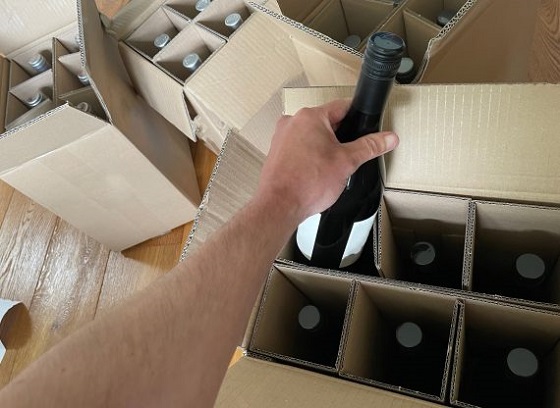Business
Provincial governments should follow Manitoba’s lead and allow the online sale of alcoholic beverages from other provinces

From the Montreal Economic Institute
By Shal Marriott and Gabriel Giguère
Removing Interprovincial Barriers to Online Alcohol Sales
Canada’s provincial and territorial governments should allow consumers to shop online for alcoholic beverages produced elsewhere in the country, indicates an MEI publication.
“The restrictions imposed by provincial alcohol monopolies are such that it is sometimes easier for a Canadian producer to sell its products on the other side of the world than in the province next door,” explains Shal Marriott, research associate at the MEI and author of the study. “By allowing producers to sell their products online, directly to consumers, our provincial governments would remove obstacles to their growth.”
In 2019, the federal, provincial, and territorial governments had committed to improving interprovincial trade in alcoholic beverages. This commitment stems directly from the Canadian Free Trade Agreement, signed two years before.
Manitoba is the only province to allow its residents to shop online for Canadian alcoholic beverages from other provinces, without restriction.
British Columbia, Saskatchewan, Alberta, and Nova Scotia have partial restrictions, allowing consumers to shop online for certain categories of products from specific parts of the country.
Ontario, Quebec, New Brunswick, Prince Edward Island, and Newfoundland and Labrador each continue to prohibit consumers from shopping online for alcoholic beverages from outside the province.
“By opening the door to this online commerce, our provincial governments would allow consumers to discover new products that they otherwise cannot purchase at home,” says Ms. Marriott. “This is the kind of simple measure that could also give our microbreweries, our wineries, and our distilleries a helping hand.”
The alcoholic beverage sector contributes over $4.4 billion to the Canadian economy, according to the latest available data.
Viewpoint calling on Canada’s provincial governments to allow the unrestricted online purchase and shipment of alcoholic beverages from one province to another
* * *
This Viewpoint was prepared by Shal Marriott, Research Associate at the MEI, in collaboration with Gabriel Giguère, Senior Policy Analyst at the MEI. The MEI’s Regulation Series aims to examine the often unintended consequences for individuals and businesses of various laws and rules, in contrast with their stated goals.
In October 2012, retiree Gerard Comeau was stopped by the RCMP and fined for bringing a too large quantity of beer and liquor from Quebec into New Brunswick, violating the personal exemption limit in place. In its ruling on the Comeau case in April 2018, the Supreme Court of Canada upheld provincial governments’ right to maintain such restrictions, provided they did not intentionally impede interprovincial alcohol trade.(1)
A year later, however, the federal government and the provinces agreed on an Action Plan “to enhance interprovincial trade of alcoholic beverages,” stemming from the 2017 Canadian Free Trade Agreement (CFTA).(2) This included increasing, and ultimately eliminating, personal use exemption limits (which set the amount of alcohol one can bring back from another province) and creating e-commerce platforms.(3)
Some progress has been made to raise or remove personal exemption limits across the country, meaning that Canadians can now import and transport alcohol more easily across most provincial lines for personal consumption, without penalty.(4) Most provinces, however, have failed to liberalize other areas of interprovincial alcohol trade, such as interprovincial online retail sales of alcoholic products, thus depriving Canadians of the benefits of greater competition, namely a broader choice of products and lower prices.
The Current State of Online Alcohol Retail Sales
There have been some efforts to allow greater freedom in online alcohol sales, such as Saskatchewan and British Columbia allowing a limited form of direct-to-consumer sales and shipping of wine and craft spirits from producers in the other province.(5) However, most Canadian provinces continue to prohibit the online retail sale of alcoholic beverages from other provinces directly to their consumers. For example, the Société des alcools du Québec (SAQ) states that while producers are not restricted formally from offering to sell to residents of Quebec, it is illegal for those Quebec residents to make such purchases and have them shipped into the province.(6)
As can be seen in Table 1, few provinces allow producers from other provinces to ship directly to consumers. Manitoba is the only Canadian province with no interprovincial online purchasing restrictions. The restrictions that have been removed in Western provinces and Nova Scotia are also relatively limited (and mainly concern wine). Quebec and Ontario retain complete prohibitions, which is hardly surprising as they are also among the provinces that have made the least progress towards the liberalization of internal trade more broadly.(7)

While we see some improvement in Alberta’s willingness to allow some direct-to-consumer shipments, continued protectionism still exists in the province’s alcohol trade. For example, in January 2024, the Alberta Gaming, Liquor and Cannabis (AGLC) corporation argued that direct-to-consumer shipping was having a negative impact on the provincial liquor monopoly.(8) In reaction, it threatened to stop selling BC wines in its stores until this practice ceased, and this position was seemingly supported by the Alberta government as there was no action to condemn the stance of the AGLC.(9)
Although a memorandum of understanding was reached six months later, ending a temporary ban that had been imposed, this showcases that provincial liquor monopolies, and provincial governments, are willing to enforce interprovincial trade barriers that ultimately deprive Canadian producers and consumers.(10)
The Benefits of Direct-to-Consumer Purchasing Online
There has been a general growth in the online consumer goods market, but Canadian producers and consumers of alcohol products have been unable to fully participate in, and benefit from, this opportunity. This protects provincial alcohol monopolies with their brick-and-mortar stores, which are thus shielded from online competition, at the expense of consumers and producers, whose ability to engage in trade with each other is limited.(11)
Liquor monopolies thus find it easier to impose artificially high prices on the products they retail. The SAQ, for instance, imposes markups on bottles of wine which, when combined with excise and sales taxes, can account for over 75% of the retail price of the product.(12)
Abolishing these restrictions on interprovincial shipping directly to consumers would allow Canadians in any province to freely order online from alcohol producers anywhere in the country. Online sales are one of the most convenient ways for consumers to purchase alcohol from other provinces. Opening up this type of commerce would also be good for smaller breweries, wineries, and distilleries, allowing them to expand their reach within the domestic market.
The federal government has declared a commitment to an increasingly liberalized domestic alcohol market.(13) Yet, this liberalization is being hindered by provincial governments and alcohol monopolies that limit the growth of the domestic market. For the sake of Canadian consumers and producers alike, the provinces should simply allow the unrestricted online purchase and shipment of alcohol from other provinces.
Business
Quebecers want feds to focus on illegal gun smuggling not gun confiscation

The Canadian Taxpayers Federation released new Leger polling showing that half of Quebecers say the most effective way to reduce gun crime is to crack down on illegal gun smuggling from the United States, not a federal gun ban and confiscation.
“Law enforcement experts say the best way to make Canada safer is to stop illegal gun smuggling and Quebecers say exactly the same thing,” said Nicolas Gagnon, CTF Quebec Director. “It makes no sense to pour hundreds of millions into a confiscation that only takes guns from lawfully licensed gun owners.”
In 2020, the federal government launched its policy to confiscate thousands of so-called “assault-style” firearms from licensed gun owners. Ottawa recently announced a pilot project in Cape Breton to start taking firearms from individual owners.
The Leger poll asked Quebecers what they think is the most effective way to reduce gun crime. Results of the poll show:
- 51 per cent say introducing tougher measures to stop the illegal smuggling of guns into Canada from the United States
- 37 per cent say banning the sale and ownership of many different makes and models of guns along with a government buyback program
- Six per cent say neither of these options
- Seven per cent do not know
The results of the polls arrived as recorded remarks from Public Safety Minister Gary Anandasangaree made headlines in September.
In a leaked audio recording, the minister suggested the confiscation program is being pushed in part because of voters in Quebec, while also expressing doubt that local police services have the resources to enforce it.
Police organizations have long warned Ottawa’s confiscation program is misguided. The RCMP union says it “diverts extremely important personnel, resources, and funding away from addressing the more immediate and growing threat of criminal use of illegal firearms.”
The program was first estimated to cost $200 million. Just providing compensation for the banned guns, not including administrative costs, could cost up to $756 million, according to the Parliamentary Budget Officer.
Premiers of Alberta and Saskatchewan have both publicly said that they would not cooperate with Ottawa’s gun ban. Premier François Legault has stayed silent on this issue.
“Quebecers have been clear: the real problem is illegal gun smuggling, not law-abiding firearms owners,” said Gagnon. “The police have also made it clear the gun confiscation will waste money that could be used to stop criminals from committing gun crimes.
“Legault needs to stand up for Quebec taxpayers and refuse to help implement Ottawa’s costly and ineffective confiscation scheme. The federal government needs to drop this plan and focus its resources on intercepting illegal guns at the border: that’s how you actually make communities safer.”
Business
Emission regulations harm Canadians in exchange for no environmental benefit

From the Fraser Institute
By Julio Mejía and Elmira Aliakbari
The PBO estimates that the CFR will decrease Canada’s economic output by up to 0.3 per cent—or approximately $9.0 billion—in 2030. For context, that’s more than the entire output of Prince Edward Island in 2024, so the effects are roughly equivalent to wiping out the economy of a whole province.
The Carney government recently announced changes to the Clean Fuel Regulations (CFR), signalling stricter carbon content rules for gasoline and diesel—though few details were provided. While the prime minister expressed confidence that the changes will strengthen the Canadian economy, in reality, the CFR is designed to increase fuel prices in exchange for negligible environmental benefits. If the government is serious about prioritizing the wellbeing of Canadians, it shouldn’t tinker with the CFR—it should eliminate it.
The CFR, which came into effect in July 2023, aims to reduce greenhouse gas (GHG) emissions by requiring a gradual reduction in the carbon content of gasoline and diesel. By 2030, fuels must contain 15 per cent fewer GHG per unit of energy than in 2016. Those who don’t meet the target must buy compliance credits, which raises their costs. Ultimately, these costs are all passed on to Canadians at the pump.
According to a recent study by the Parliamentary Budget Officer (PBO), the CFR is expected to increase fuel prices by up to 17 cents per litre for gasoline and 16 cents for diesel by 2030. These costs will be added on top of already high, policy-driven fuel costs. In 2023, for example, the average price of gasoline in Canada was 157.3 Canadian cents per litre, compared to just 129.4 cents per litre in the United States—a 21 per cent difference, mainly the result of fuel taxes in Canada.
As fuel prices rise due to the CFR, the costs of running tractors, powering machinery, and producing and transporting goods and services will all increase, setting off ripple effects across our economy. The PBO estimates that the CFR will decrease Canada’s economic output by up to 0.3 per cent—or approximately $9.0 billion—in 2030. For context, that’s more than the entire output of Prince Edward Island in 2024, so the effects are roughly equivalent to wiping out the economy of a whole province.
Of course, increases in fuel prices also mean more pressure to household budgets. The PBO estimates that in 2030, the average Canadian household will incur $573 in additional costs because of the changes to the CFR, and lower-income households will bear a disproportionately larger burden because they spend more of their budget on energy.
The policy’s uneven impact across provinces is particularly significant for lower-income regions. For example, households in Nova Scotia and P.E.I.—two of the provinces with the lowest median household incomes—are expected to bear average annual costs of $635 and $569, respectively. In contrast, families in Ontario and British Columbia—two of the provinces with higher median household incomes—will pay less, $495 and $384 per year, respectively. Simply put, the CFR imposes more costs on those who make less.
To make matters worse, the expected environmental benefits of the CFR are negligible. Even if it delivers its full projected reduction of 26 million tonnes of GHG emissions by 2030, that represents only “two weeks of greenhouse gas emissions from the Canadian economy,” according to the federal government.
Given that GHG emissions cross all borders regardless of where they originate, in a broader perspective, that reduction represents just 0.04 per cent of projected global emissions by 2030. So, Canadians are being asked to pay a material price for a measure that will have virtually no environmental impact.
Toughening regulations on carbon content for gas and diesel won’t benefit Canadians, in fact, it will do the opposite. The CFR places a real financial burden on Canadian households while delivering no meaningful environmental benefit. When a policy’s costs vastly outweigh its benefits, the answer isn’t to adjust it, it’s to scrap it.

Julio Mejía
-

 City of Red Deer1 day ago
City of Red Deer1 day agoPlan Ahead: Voting May Take a Little Longer This Election Day
-

 Crime19 hours ago
Crime19 hours agoFrance stunned after thieves loot Louvre of Napoleon’s crown jewels
-

 Uncategorized20 hours ago
Uncategorized20 hours agoNew report warns WHO health rules erode Canada’s democracy and Charter rights
-

 Media2 days ago
Media2 days agoCanada’s top Parliamentary reporters easily manipulated by the PMO’s “anonymous sources”
-

 Business1 day ago
Business1 day agoUS government buys stakes in two Canadian mining companies
-

 espionage2 days ago
espionage2 days ago“Suitcase of Cash” and Secret Meeting Deepen Britain’s Beijing Espionage Crisis
-

 Agriculture2 days ago
Agriculture2 days agoIs the CFIA a Rogue Agency or Just Taking Orders from a Rogue Federal Government?
-

 Energy21 hours ago
Energy21 hours agoMinus Forty and the Myth of Easy Energy




